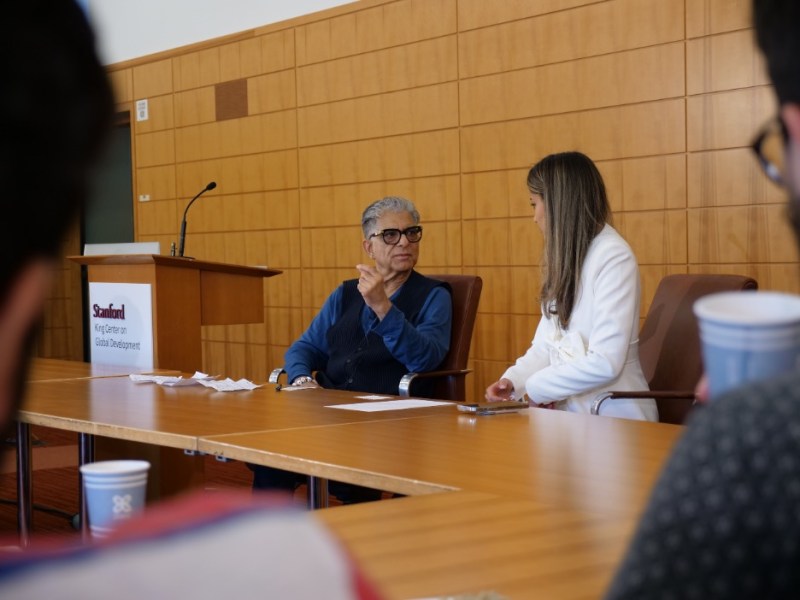To some, eco-anxiety — defined as extreme worry about climate change — can lead to the belief that the climate crisis is a problem too big to solve. In a survey of 10,000 youth between the ages 16-25 in 2020, “over 45% said their feelings about climate change negatively affected their daily life and functioning.”
As part of a Thursday event hosted by the King Center on Global Development, author and mindfulness advocate Dr. Deepak Chopra shared his answer for how to navigate some individuals’ crippling eco-anxiety. The discussion, facilitated by climate activist Sophia Kianni ’24, examined intergenerational attitudes toward climate change, climate anxiety and the steps that youth and AI can take to mitigate the current climate crisis.
Chopra’s answer encourages youth to strive to be their happiest self because “happy people see opportunity where there is adversity” and are more likely to take action rather than be paralyzed by fear.
Chopra’s happiness equation is his answer to climate anxiety. As he described, happiness equals your happiness set point, plus current living conditions, plus voluntary choices — (H=S+C+V). He emphasized that people should be mindful of the voluntary choices they make in their day to day lives because those choices have the power to cause or clear anxiety about the world around us.
He argues that our psychological construct of the environment — the fact that we acknowledge it as “separate” from us — has alienated humans from mother nature and is the primary cause of the current climate crisis. People are less likely to care about problems that aren’t tied to them and ones that they don’t deeply understand, according to Chopra.
He emphasized the need to harmonize deeply with the biosphere that is our body and our surroundings and gave examples of how some native tribes treat trees as their lungs, air as their breath and rivers as their circulation. “We are interbeings,” he said.
A large part of Chopra’s discussion focused on the importance of well-being and the idea that youth who have good mental health have the greatest capacity to make positive change. “Well-being can predict the future,” Chopra said. As evidence, he pointed to modern interventions like using AI chatbots as opposed to human therapists to treat youth mental health conditions that have been shown to be effective.
“Where do you look for answers?” Kianni asked as she brought many college students; mental health struggles throughout college — a “rat race” as she called it in the case of Stanford. “Within” Chopra replied, saying that self-discovery is crucial to understanding yourself and what you can contribute to the world.
Chopra elaborated, saying that inner reflection can also help you master the types of leadership styles that suit you best, tying it back to climate by saying that in the lens of the climate crisis, this is crucial to know when putting together teams that will work on solutions.
Chopra spoke on his belief that current successful leaders have learned from ways of past ones like Mahatma Gandhi and Martin Luther King Jr. When asked about the qualities of a good leader, Chopra detailed an acronym LEADER. According to him, L represents the ability to look and listen, E for emotional engagement, A for awareness, D for having a dream, E for creating a positive environment, R for taking responsibility, and S for achieving synchronicity.
Kianni continued the leadership discussion by encouraging Stanford students to take charge and look for ways that they could contribute to reducing the effects of climate change. “All majors can be climate majors,” Kianni said, in support of her belief that every discipline has the capacity to contribute to the climate solution.
